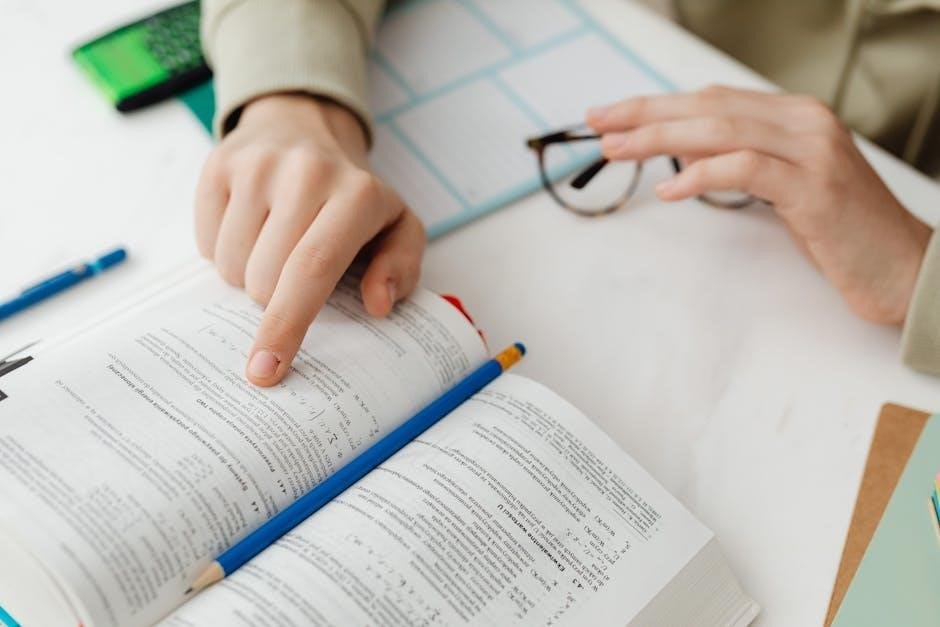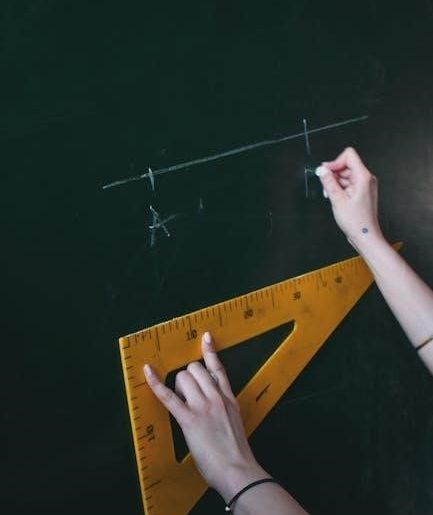Jo Boaler’s Mathematical Mindsets revolutionizes math education by emphasizing growth mindsets, creative problem-solving, and the brain’s ability to adapt․ This approach challenges fixed beliefs about math ability, offering practical strategies for teachers and parents to foster mathematical confidence and success in students of all ages․

Overview of the Book
Jo Boaler’s Mathematical Mindsets presents a transformative approach to mathematics education, challenging traditional beliefs about innate math ability․ The book emphasizes the concept of a growth mindset, arguing that math skills can be developed through effort, creativity, and persistence․ Boaler draws on neuroscientific research to demonstrate the brain’s remarkable ability to adapt and grow, debunking the idea that math talent is fixed․ She addresses the pervasive issue of math anxiety, highlighting its detrimental effects on learning and providing strategies to overcome it․ The book also explores the importance of number sense and its role in building a strong mathematical foundation․ Practical strategies for teachers and parents are woven throughout, offering innovative ways to engage students and foster a love for math․ By focusing on real-world applications and creative problem-solving, Boaler empowers educators and caregivers to help all students unlock their mathematical potential․ This book is a powerful resource for transforming math education and nurturing confident, resilient learners․
Jo Boaler’s Background and Expertise
Jo Boaler is a renowned Professor of Mathematics Education at Stanford University and the co-founder of youcubed, a platform dedicated to transforming math education․ With a Ph․D․ in Mathematics Education, Boaler has spent decades researching how students learn math, focusing on mindset, equity, and creativity․ Her work challenges traditional teaching methods, emphasizing the importance of growth mindsets and the role of the brain in learning․ Boaler has authored numerous influential books, including Mathematical Mindsets and Limitless Mind, which have reshaped perspectives on math education globally․ Her research has been recognized with multiple awards, solidifying her expertise in the field․ Boaler’s approach is grounded in neuroscientific evidence, showing that math ability is not fixed but can be developed through practice and positive attitudes․ Her work has inspired educators and parents worldwide to adopt innovative strategies that foster mathematical confidence and success․

Key Concepts in Mathematical Mindsets
Jo Boaler’s work highlights the importance of growth mindsets, the brain’s adaptability, and overcoming math anxiety․ She emphasizes creative problem-solving, number sense, and the idea that math ability can be developed through effort and practice․
Growth Mindset vs․ Fixed Mindset
A growth mindset, as outlined by Jo Boaler, is the belief that abilities and intelligence can be developed through dedication and effort․ This contrasts sharply with a fixed mindset, which assumes that math talent is innate and unchangeable․ Boaler’s research demonstrates that students with a growth mindset approach challenges with resilience, viewing failures as learning opportunities․ In contrast, those with a fixed mindset often avoid difficult tasks, fearing they will reveal their perceived limitations․ By fostering a growth mindset, educators and parents can empower students to embrace math as a dynamic, evolving skill rather than an inherent talent․ This shift in perspective has been shown to significantly enhance math performance and overall confidence in learning․
The Brain’s Ability to Change and Adapt
Jo Boaler highlights groundbreaking neuroscientific research showing that the brain is highly malleable and capable of growth throughout life․ This concept, known as neuroplasticity, challenges the outdated belief that intelligence is fixed․ Boaler explains that engaging in challenging math activities can actually increase gray matter in the brain, particularly in areas responsible for problem-solving and memory․ She emphasizes that this adaptability is not limited to young learners; individuals of any age can develop their mathematical abilities․ By understanding and leveraging this brain flexibility, educators and parents can create learning environments that encourage continuous growth and development․ Boaler’s work underscores the importance of viewing math as a skill that can be cultivated, rather than an innate talent, empowering students to embrace challenges with confidence and curiosity․
Math Anxiety and Its Impact on Learning
Math anxiety is a pervasive issue that significantly hinders learning, as highlighted in Jo Boaler’s Mathematical Mindsets․ This phenomenon occurs when students experience fear or discomfort in math-related situations, leading to decreased performance and motivation․ Boaler explains that math anxiety often stems from fixed mindset beliefs, where students see math ability as innate rather than developed through effort․ This mindset causes students to avoid challenges, fearing failure will confirm their perceived inadequacy․ Chronic math anxiety can impair working memory and problem-solving skills, creating a cycle of underachievement․ Boaler emphasizes the need for educators and parents to recognize and address math anxiety by fostering a growth mindset and creating supportive learning environments․ By reducing stress and promoting positive attitudes toward math, it is possible to help students overcome anxiety and unlock their full mathematical potential; Addressing this issue is crucial for ensuring all learners can thrive in math and beyond․

Practical Strategies for Teachers
Jo Boaler offers innovative strategies for educators, including fostering growth mindsets, incorporating real-world problem-solving, and using visual, creative math activities to engage students and build confidence in their mathematical abilities effectively․
Encouraging Growth Mindset in the Classroom
Fostering a growth mindset in the classroom is central to Jo Boaler’s approach․ Teachers can encourage this by praising effort, not just results, and emphasizing that mistakes are opportunities for growth․ Open-ended math tasks and collaborative problem-solving activities help students see math as a process of exploration and learning․ Boaler also suggests using visual and creative math tools, such as manipulatives or real-world applications, to make math accessible and engaging․ By creating a supportive environment where students feel safe to take risks, teachers can help students develop a positive relationship with math and build resilience․ These strategies align with Boaler’s belief that all students can succeed in math with the right mindset and teaching practices․
Creative Math Activities and Problem-Solving
Jo Boaler advocates for creative math activities that go beyond traditional rote learning․ These activities, such as open-ended problems and real-world applications, encourage deep thinking and problem-solving skills․ For instance, using visual aids like geometric shapes or interactive games can make math more engaging․ Boaler suggests incorporating collaborative projects where students work together to solve complex tasks, fostering teamwork and communication․ Additionally, integrating art and storytelling into math lessons can help students connect abstract concepts with tangible experiences․ By moving away from standardized methods, teachers can create a dynamic learning environment where students explore and discover mathematical concepts through creativity and critical thinking․ Such approaches not only enhance understanding but also build confidence and a love for math in students of all ages․

Role of Number Sense in Mathematical Development
Number sense, the ability to understand and manipulate numerical relationships, is a cornerstone of mathematical development․ According to Jo Boaler, fostering number sense in students is crucial for building a strong mathematical foundation․ This involves teaching concepts such as place value, mental arithmetic, and the relationships between numbers in a way that emphasizes understanding over memorization․ Activities that encourage number sense include using number lines, manipulatives, and real-world examples to make abstract concepts tangible․ Boaler also highlights the importance of number talks and discussions, where students explore different strategies for solving problems․ By nurturing number sense, teachers can help students develop flexibility and confidence in their mathematical abilities, laying the groundwork for future success in more complex areas of math․

Strategies for Parents
Parents play a vital role in nurturing a growth mindset at home․ By engaging children in real-world math applications and praising effort over results, parents can foster a love for learning and build confidence in their child’s mathematical abilities․
How Parents Can Support a Growth Mindset at Home
Parents can significantly influence their child’s mathematical development by fostering a growth mindset at home; This involves praising effort rather than results, encouraging persistence, and embracing challenges as opportunities to learn․ Simple practices like discussing math positively, exploring real-world applications, and engaging in fun, creative activities can help build confidence and curiosity․ Parents should also model a growth mindset themselves, showing their children that learning is a lifelong process․ By creating a supportive environment free from anxiety, parents can empower their children to view math as an exciting and accessible subject․ Sharing stories of overcoming difficulties and celebrating progress, no matter how small, reinforces the idea that ability grows with effort․ These strategies not only enhance math skills but also cultivate resilience and a love for learning that extends beyond the classroom․
Engaging Children in Math Through Real-World Applications
Engaging children in math through real-world applications is a powerful way to make learning relevant and exciting․ Jo Boaler emphasizes the importance of connecting math to everyday life, showing how concepts like fractions, geometry, and algebra appear in activities such as cooking, budgeting, or DIY projects․ By exploring math in these contexts, children develop a deeper understanding and appreciation for its practical value․ Encouraging curiosity and exploration, parents and educators can help children see math as a tool for problem-solving and creativity․ For example, measuring ingredients while baking or calculating costs while shopping can make math feel natural and meaningful․ This approach not only builds confidence but also fosters a growth mindset, as children learn to view challenges as opportunities to learn and grow․ By linking math to real-world experiences, we can inspire a lifelong love of learning and empower children to see math as a vital part of their daily lives․

Research and Studies Supporting the Approach
Neuroscientific studies reveal the brain’s adaptability, supporting Boaler’s growth mindset theory․ Research shows mindset shifts significantly improve math performance, proving the effectiveness of her innovative teaching strategies․
Neuroscientific Research on Math Learning
Neuroscientific research highlights the brain’s remarkable adaptability in math learning, as demonstrated by studies showing that intense math practice can physically alter brain structure․ Functional MRI scans reveal that areas like the hippocampus and prefrontal cortex, associated with memory and problem-solving, are highly active during mathematical tasks․ These findings support Jo Boaler’s argument that the brain can grow and change, challenging the notion of fixed math ability․ Research also indicates that math anxiety can inhibit neural activity in these critical regions, while a growth mindset fosters increased engagement and plasticity․ By understanding how the brain responds to math, educators can design strategies that maximize learning potential, emphasizing creativity, persistence, and deeper conceptual understanding․ Boaler’s work bridges neuroscience and education, offering a transformative approach to teaching and learning mathematics at all levels․
Impact of Mindset on Math Performance
Jo Boaler’s research underscores the profound impact of mindset on math performance, revealing that students with a growth mindset consistently outperform those with a fixed mindset․ A growth mindset, which believes abilities can be developed through effort and learning, fosters resilience and a love for challenges․ In contrast, a fixed mindset, which views math ability as innate, often leads to avoidance of difficult tasks and decreased performance under pressure․ Studies show that when students embrace a growth mindset, they exhibit higher levels of engagement, better problem-solving strategies, and improved academic outcomes․ Boaler’s work demonstrates that mindset interventions can significantly narrow achievement gaps, particularly for underrepresented groups in math․ By cultivating a growth mindset, educators and parents can empower students to view challenges as opportunities for growth, leading to greater confidence and success in mathematics․

Book Reviews and Feedback
Jo Boaler’s Mathematical Mindsets has received widespread acclaim for its innovative approach to math education․ Educators and parents praise its practical strategies and inspiring messages, while students report increased confidence and enjoyment in learning math․
Educator Feedback on Mathematical Mindsets
Educator Feedback on Mathematical Mindsets
Educators worldwide have praised Mathematical Mindsets for its transformative impact on teaching practices․ Many highlight how the book’s emphasis on growth mindsets and creative math activities has reinvigorated their classrooms, fostering a love for mathematics in students․ Teachers appreciate the practical strategies provided, which they find easy to implement and effective in addressing math anxiety․ The book’s focus on number sense and real-world applications has also been commended for making math more accessible and engaging for diverse learners․ Overall, educators agree that Boaler’s approach not only enhances student performance but also shifts the cultural perception of mathematics, making it a subject of exploration and joy rather than fear and memorization․
Parent Testimonials and Success Stories
Parents have shared inspiring stories of how Mathematical Mindsets transformed their children’s relationship with math․ Many report a significant reduction in math anxiety and a noticeable increase in confidence․ One parent highlighted how their child, once reluctant to engage with math, now eagerly participates in problem-solving activities․ The strategies outlined in the book, such as embracing mistakes and focusing on understanding over speed, have been particularly impactful․ Families have also appreciated the emphasis on real-world applications, making math more relevant and enjoyable․ Several parents noted how the book empowered them to support their children’s learning in a more effective and positive way․ Overall, the testimonials reflect a common theme: Mathematical Mindsets has not only improved academic performance but also fostered a lifelong appreciation for mathematics in both children and parents alike․
Jo Boaler’s Mathematical Mindsets empowers students and educators by fostering a growth mindset, reducing math anxiety, and emphasizing the brain’s adaptability․ This transformative approach inspires a lifelong love for math and learning․
Jo Boaler’s Mathematical Mindsets offers a transformative approach to math education, emphasizing the importance of a growth mindset, creative problem-solving, and understanding the brain’s adaptability․ Key takeaways include:
- The brain’s ability to grow and change challenges fixed beliefs about math ability․
- Math anxiety can be addressed through positive messaging and inclusive teaching practices․
- Teachers and parents should encourage curiosity, persistence, and deeper mathematical understanding․
- Number sense and real-world applications are vital for developing mathematical confidence․
- Practical strategies, such as open-ended tasks and collaborative learning, foster a love for math․
By shifting mindsets and practices, Boaler provides a roadmap to unlock every student’s mathematical potential․
Future Directions in Math Education
Jo Boaler envisions a future where math education focuses on fostering creativity, collaboration, and a growth mindset․ She advocates for:
- Integrating real-world applications to make math relevant and engaging․
- Encouraging open-ended problem-solving to develop critical thinking․
- Reducing math anxiety through positive messaging and inclusive practices․
- Utilizing neuroscientific research to inform teaching methods․
- Empowering teachers with innovative strategies to support diverse learners․
By prioritizing these approaches, math education can become more equitable and effective, helping students develop a lifelong love for learning and problem-solving․

References and Further Reading
Key references include Mathematical Mindsets by Jo Boaler, Mindset: The New Psychology of Success by Carol Dweck, and additional resources on growth mindset available through youcubed․org for deeper exploration․
Jo Boaler’s Published Works
Jo Boaler, a renowned mathematics education professor at Stanford University, has authored several influential books and research papers․ Her most notable work, Mathematical Mindsets, challenges traditional math education by advocating for a growth mindset approach․ This book provides practical strategies for teachers and parents to nurture mathematical confidence and ability in students․ Boaler has also co-founded youcubed․org, a platform offering free math resources to redefine students’ relationships with math․ Additionally, her work Limitless Mind expands on the concept of growth mindsets, emphasizing the brain’s potential to grow and adapt․ Boaler’s research and writings have significantly impacted math education globally, inspiring a shift toward more creative and inclusive teaching methods․ Her publications are widely referenced in educational circles and continue to influence policymakers, educators, and parents seeking to improve math learning outcomes for all students․

Additional Resources on Growth Mindset
Beyond Mathematical Mindsets, Jo Boaler offers a wealth of resources to deepen understanding of growth mindset principles․ Her website, youcubed․org, provides free math lessons, videos, and activities designed to inspire creative problem-solving and foster a love for math․ Additionally, Boaler has collaborated with other educators to create online courses and workshops that train teachers in implementing growth mindset strategies․ For further reading, Limitless Mind by Jo Boaler extends her work, offering insights into overcoming math anxiety and unlocking potential․ Other recommended resources include works by Carol Dweck, the pioneer of mindset theory, and books like The Growth Mindset Coach by Annie Brock․ These materials, along with Boaler’s research papers and TED Talks, provide a comprehensive toolkit for educators and parents to cultivate a growth mindset in math education․ Together, these resources empower learners to embrace challenges and view math as a dynamic, evolving skill․
